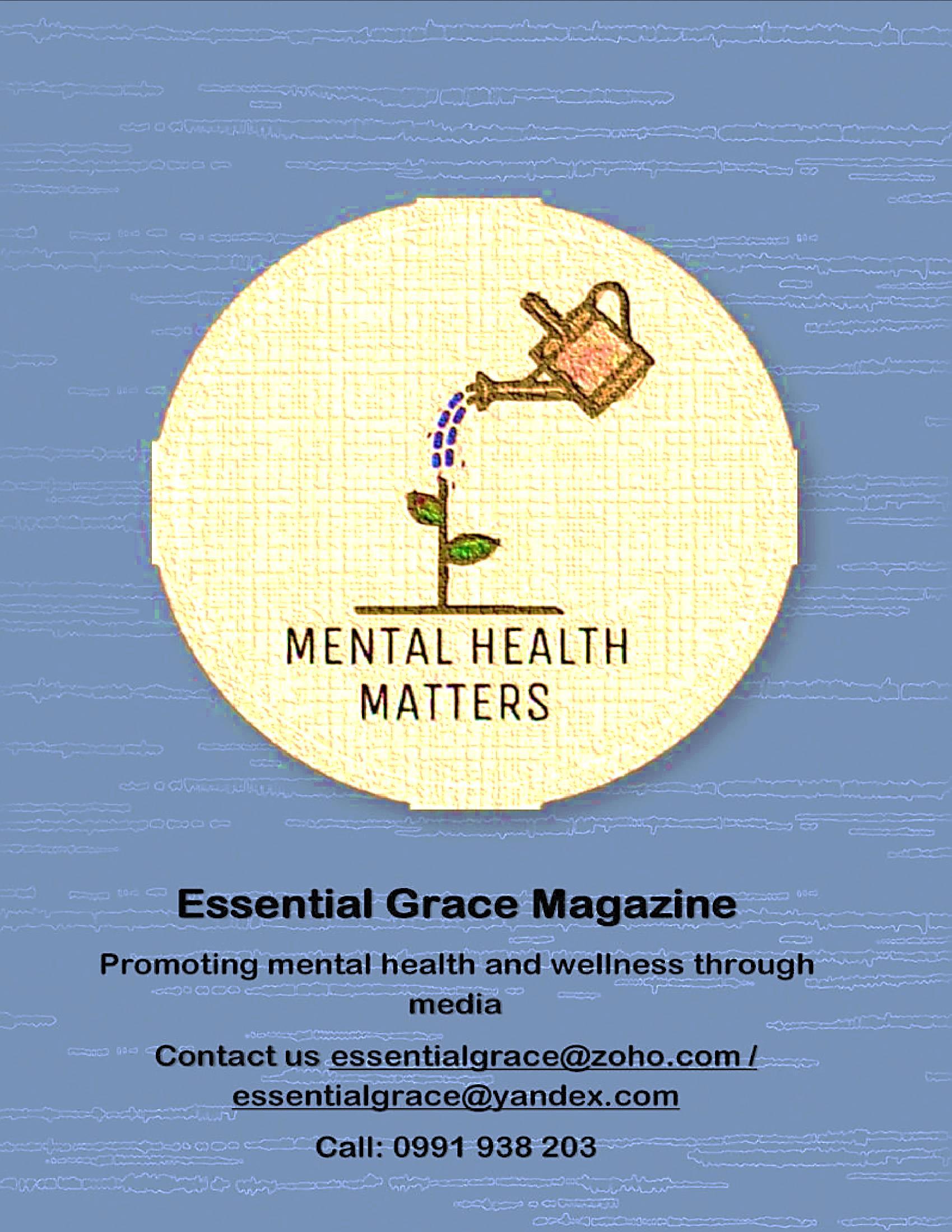Essential Grace Magazine
Mental Health and Wellness January

3 Issue 6
2023 Vol.



2 | Essential Grace Magazine January 2023
The difference between a stumbling block and a stepping stone is how high you rise your foot.
Benny Lewis












3 | Essential Grace Magazine January 2023 Did you know … Most of our editorial content is contributed by our readers. We welcome your ideas, articles, questions, images, and feedback. Submit your content to the editor at essentialgrace@zoho.com Essential Grace is a free online publication that is focused of promoting mental health and wellness in Malawi and around the world. Follow and subscribe to the magazine at www.issuu.com/essentialgrace follow, like, and share on our social media platforms; @EssentialGraceMagazine @essentialgracemagazine.mw 0995 147 290 Comments and feedback on any of our content can be addressed to essentialgrace@zoho.com
Happy New Year!
I hope that you and yours have started the year well. January is kind of like Mondays, a chance to start over, to make new goals and have fresh dreams. Whether those dreams and goals actually materialize is another story. It’s good to have the chance to start over.
January is also a time to commit ourselves to our own mental wellness. We can often get caught up with other practicalities such as financial or physical fitness goals while forgetting our emotional and mental wellbeing. It is particularly important to be aware of our mental wellbeing at the beginning of the year when all the December festive energy has ended, family members have left, money is stretched, and most people have to return to their jobs. Many people struggle with returning to the reality of everyday life.
We have included a few tips on how to boost your mental wellbeing, and how to care for yourself as you go into a fresh new year. We have also focused on a topic that seldom gets talked about, living with family members or a spouse that is suffering from mental illness. There are a lot of challenges that people face in such contexts, and there is a lot of support and information needed to help them have some level of mental wellness that helps them to thrive.
Want to get in touch? You may do so through our social media pages or directly to the editor through essentialgrace@zoho.com
Julie Soko ManagingEditor
4 | Essential Grace Magazine January 2023
Happy Reading!
Why Is Mental Wellness Month January 2023
Celebrated?
People often feel a merry cheer while celebrating Christmas and welcoming the new year. However, for many people, these events are an indicator of the struggles about to come. The rates of seasonal depression, loneliness, and post-celebration blues are at an all-time high following new year’s eve.
Mental Wellness Month serves as a reminder to maintain and sustain your mental health, despite the ups and downs in life. One example of this is honoring the connection between your body and mind. For instance, many people make new year’s resolutions that include exercise, weight loss, and dieting. However, mental health and wellness are just as important as physical health.



How can you take part in mental wellness month?
Spend more time with your loved ones
Spending time with your loved ones can improve your mood and happiness, not just around the holidays. Multiple studies show that social interaction that includes face-toface talking and eye contact can enhance the quality of your relationships.
Show gratitude for the good things in life
We tend to ignore the positive things while focusing on the negatives. Gratitude is a practice that can help you reverse this tendency. For instance, you can start by being grateful for your physical and mental health, followed by your relationships, possessions, achievements, etc.
Plan a trip(solo or with your friends)
Traveling and spending time with nature can improve your mood, help you step out of your comfort zone, and provide you with lifetime memories.
Take better care of yourself
5 | Essential Grace Magazine January 2023
Self-care is a necessary skill that can help you regulate your physical and mental health in periods of immense stress. Some ways to take care of yourself are decreasing screen time, meditating and doing nothing, and spending time with people you love.

Opt for therapy
Contrary to popular belief, therapy is not just for the mentally ill or those suffering from mental health issues. Therapy teaches essential life skills that can help you become more emotionally intelligent, improve the quality of your work and relationships, and live a more relaxed, stress-free life.
Read more of this article and find helpful online resources here.
6 | Essential Grace Magazine January 2023
Practical Mental Wellness
In Malawi, we have been hearing many stories of suicides and mental breakdowns over the years. Most of these are associated with romantic relationships gone wrong, or financial issues.
Hearing about and reading such stories may have a negative impact on people, it may give the impression that failed relationships and financial crisis are an inescapable part of life that can be justifiable reasons to commit suicide.
What if we could focus more on taking better care of ourselves, work on building emotional and mental resilience, learn how to regulate emotions, that will help to withstand the hardships that may be faced in life.
The whole point of mental wellness is to ensure we are healthy and stable in order to thrive in life, not to simply survive. Here are some suggestions on how to boost mental wellness.
Mental
resilience
Resilience is our ability to handle difficult situations and recover well once we are knocked down. Some people are
able to withstand a lot of pressure and face challenges really well. While at the same time there are others who do not have the capacity to handle small pressures or challenges, they are easily overwhelmed and lose hope.
The difference between a mentally fit person and one that lacks mental resilience is their ability to find purpose in life, to believe in themselves, to develop a good support structure, to confidently embrace change, to establish and commit to reaching their goals, and to engage in good self-care practice.



Emotional resilience
Having emotional resilience allows a person to adapt quickly during a crisis or stressful situation such as a difficult breakup or marital distress. Although some people are naturally born with emotional resilience, it is a trait that can be learnt and developed with some conscious effort.
Some of the qualities of an emotionally resilient person include being emotionally aware, having perseverance, choosing an optimistic mindset, having an internal locus of control, being able to have and access social support, having a healthy sense of
7 | Essential Grace Magazine January 2023
humour, being able to create meaning and maintain healthy perspective, and having a healthy spiritual life.

Both emotional and mental resilience are not factors that can simply exist in a person. They require personal effort and the desire to be better for one’s own sake. Three ways you can do this is to ensure you build healthy connections with people, manage your thoughts, and take good of yourself.
Emotional regulation
Emotional regulation is mainly about managing feelings and reactions. It is important to be aware of how we react to our emotions, whether our reactions are effective, productive, and appropriate. When there is no conscious
thought between feelings and reaction, it may lead to impulsive behaviour such as violence, self-harm, and even suicide. With healthy regulation and selfcontrol, it becomes easier to behave in such way as to be authentic to ourselves, to be consistent in our values and beliefs.
Some ways through which one can learn to regulate their emotions is through developing self-awareness especially on emotions, developing mindful awareness to how you react or respond to situations, shifting your perspective in different situations, being able to adapt, developing a good emotional support system, and practicing selfcompassion.



8 | Essential Grace Magazine January 2023
Developing Mental Wellness is something that anyone can do through research and effort. However, there are people who are trained in how to guide or support you as you go through such a process.
Should you want to develop better mental wellness practices, reach out to a life coach or mental health worker for more information.

9 | Essential Grace Magazine January 2023
Families can be beautiful structures of safety, nurturing, support, and love. A family can be the only support an individual can rely on especially when they are dealing with mental illness.

We have often highlighted the role of family and a spouse in caring for a loved one living with mental illness. In this issue, we look at how caregivers can care for themselves as they find themselves in such a position.
It can be very challenging to live with someone suffering from mental illness. Even worse if you know very little about the illness, treatment options, and resources available in the community. Caregivers are often isolated, exhausted, and may suffer from poor mental health themselves.
Should you find yourself relating to the content in this month’s issue, know that there are people out there that can help you navigate your caregiver journey. Please make use of the contact information made available in this publication to find a mental health professional near you.
10 | Essential Grace Magazine January 2023
Mental illness affects the whole family
When depression, anxiety, schizophrenia or another mental illness enter a family, the emotional cost can be high and family members can be deeply affected. Depending on their circumstances, they may struggle to help a family member who doesn’t have access to care or may not want assistance. They will need to learn how to support and encourage their loved one, and cope with the range of symptoms and behaviors of the illness.


Whether the situation is having an adult son with bipolar disorder return to live at home with mom or a teen with sky-high anxiety refusing to attend school, the whole family is affected. Or, imagine that your spouse has severe symptoms of schizophrenia but refuses to take medications.

These are just a few of the situations that people talk about in family support groups. “I’m exhausted. What am I supposed to do?” asks a father experiencing compassion fatigue. Another asks, “How do I take care of myself in all this chaos?”
Some of the top issues for family members and caregivers are:
The mental illness often becomes the family’s primary focus
Family members have different perceptions of the problem and have conflicts about the solutions
Feelings of helplessness, frustration, loss, guilt and compassion fatigue
Pine Rest Christian Health Services
Are you living with a family member who is suffering from mental illness? The next section explores some of the challenges that caregivers face, as well as suggestions on what can be done to help alleviate some of the unpleasant consequences of support a family member or spouse through mental illness.
11 | Essential Grace Magazine January 2023
Mental Health Professionals in Northern Malawi
St John of God Hospitaller Services 01311690 / 01311495
John Banda (Psychosocial Counsellor)
Moyale Barrakcs 0994 434 012
johnalickbanda05@gmail.com
Precious Chipeta (Psychosocial Counsellor) 0886 687 857 kanyakulapreciouschipeta@gmail.com
Buxton Shaba (Psychosocial Counsellor)
CEO Youth Mental Health Warrior. Mzuzu Katoto 0996 560 666
Brighton Lupeska (Psychosocial Counsellor)
Mzuzu Health Centre 0996 750 057
Jbryto20@gmail.com
Justina Msofi (Psychosocial Counsellor)




Luwinga Secondary School 0888 505 043 jasstinamsofi@yahoo.com

Jimmy Kambalame
Lighthouse Trust, Central Hospital. Mzuzu 0999 944 899
12 | Essential Grace Magazine January 2023
Mental health is all about mental well-being. Mental health is about physical, mental and social well-being. Good mental health allows someone to live a fulfilling, satisfying life while dealing with everyday challenges. An individual can improve their mental wellbeing by making positive lifestyle adjustments and pursuing a sense of purpose in life. A person’s mental health can vary throughout their life, depending on outside factors. Mental illness does not bar someone from achieving good mental health. With proper support, anyone can improve their mental well-being.
Mental illness
A mental illness is a diagnosable disorder with a standard set of criteria. It can be caused by factors like genes, brain chemistry or trauma. Anyone can have a mental illness, regardless of age, socioeconomic class, sex or race. These disorders can also be called mental health conditions.








Mental illnesses complicate mental health by affecting the way a person feels, thinks, acts or experiences the world. Different mental illnesses have different symptoms, some of which take effort to work through.

The difference between mental health and mental illness
Mental health and mental illness are not the same. Mental health affects all people, while only some experience diagnosed mental illnesses. It’s helpful to realize that mental illness does not always lead to poor mental health and that poor mental health is not always due to mental illness. Life events or other outside factors can affect anyone’s mental health, whether or not a mental illness is present.
13 | Essential Grace Magazine January 2023
Mental Health
Personal story


My sister has Schizophrenia
It was a normal rainy evening in December. I had been working long hours all week and was looking forward to a weekend of rest. We had supper as usual, although I noticed that my sister was not eating with us. In fact, she had not been eating with us for some days. She had been spending more time alone, avoiding conversation with the other family members, and eating only when she was alone in the house.
My younger sister is 28 years old had been diagnosed with schizophrenia some years ago. None of us really understood what it meant except that she has some mental illness that comes up now and again. She can become different, stop bathing and wear the same clothes, and other erratic behaviour.
On this night, I began to feel some anxiety around the dining table. No one was talking about it, but we were all sensing the tension and fear as we guessed what could be going on with our sister. We could never anticipate what would happen when she was having an episode, whether she would be safe or what she could do. I dished some food for her and took it to her room, partly to see what the situation was like.
I found her sitting on the floor of her room. The aroma in the room was that of someone who hadn’t washed themselves or their clothes for some days. She was not looking in my direction, I spoke to her and invited her to eat. She did not respond, she continued looking at the floor quietly. I put the plate down and said goodnight.
By this time, my stomach was already beginning to hurt with anxiety. I can never relax or sleep when my sister becomes ill like this. It affects me a lot, I can’t think straight or function normally. I went to my room and tried to watch movies to help fall asleep. It was around midnight when I woke up suddenly hearing the sound of loud barking. At first I thought it was the dogs outside but after some time I realised it was coming from inside the house. I got up and went quickly into the corridor to see what was happening. My sister was talking very loudly to herself on and on, she was barking at the dogs from her window.
My heart started pounding, my stomach felt really bad and I didn’t know what to do. I wanted to do something for her, to help her somehow. I went back to my room and lay on my bed in an anxious mess.
14 | Essential Grace Magazine January 2023
Coping with Mental Illness in The Family

Growing up in any family can be challenging at times. However, there are often unique issues when a family member or family members have a mental illness. Members of these families often have to deal with instability or unpredictability. Often there is confusion in family roles.
For example, children or other family members may have to take over many of the parents’ responsibilities, such as taking care of younger siblings or managing household duties usually managed by parents. They may even have the responsibility of taking care of the emotional or physical needs of their parents. Children or other family members in these situations do not always receive the care and nurturing they need. In addition, individuals who have a family member with a mental illness may feel ashamed to talk about their situation with others and consequently may withdraw from relatives or friends who could help them or support them. Oftentimes they may have difficulties to recognize and express their needs to others and even to themselves. As a result, these individuals frequently feel isolated and alone.
https://counselingcenter.illinois.edu/brochures/coping-mental-illness-family

15 | Essential Grace Magazine January 2023
Common Difficulties
Individuals who cope with chronic and severe mental illness in the family may also experience other difficulties outside of their family-of-origin relationships. These may include:

RELATIONSHIP DIFFICULTIES
Difficulty in relationships and experiencing feelings of isolation, difficulty in initiating romantic relationships and friendships, difficulty in maintaining romantic relationships and friendships, difficulty with trusting self and others, difficulty balancing level of intimacy (excessive dependence or excessive avoidance), difficulty balancing taking care of self and taking care of others, difficulty setting and enforcing healthy boundaries with others.



EMOTIONAL DIFFICULTIES
Guilt, anger or resentment, shame or embarrassment, depression, helplessness, tiredness, fear of inheriting a family member’s mental illness, fear of discovery by others, including one’s partner and friends
BEHAVIORAL DIFFICULTIES
Angry outbursts or repressed anger, inability to deal with life unless it is chaotic or in crisis. overly responsible or irresponsible in many areas of life such as commitments, money, alcohol, relationships, etc., self-defeating thoughts, attitudes, and behaviors such as “My needs don’t matter; I’m not worth much; It’s no use trying. Self-defeating themes involving a tendency to equate achievement with worth as a person, such as, “Maybe I can matter if I can excel at something, be perfect in school, my job, or my relationships. But if I fail, I’m worthless and it’s terrible.”
If you are experiencing any of these difficulties, you are not alone. It is helpful to recognize that these relationship patterns, feelings, and behaviors helped you to cope and survive thus far, and during the more vulnerable years of childhood, they even served a coping function. However, it is also critical to recognize that they may be no longer helpful and functional at this time of your life. Your recognition that these difficulties may limit your life choices as an adult is an important first step towards developing new, rewarding, and functional ways of improving the quality of your life and relating to others better.
16 | Essential Grace Magazine January 2023
How You Can Empower Yourself
Acknowledge that you have a family member with a mental illness and how it affects you. It’s normal to have feelings such as anger, shame, and guilt. Remember that you’re not responsible for causing your family member’s problems or for fixing their condition. It’s also okay to grieve the parental or familial support you never received.



Develop new ways of taking care of yourself. Recognize that you have legitimate needs and stressors and that it’s completely acceptable to take care of yourself. Try to replace negative thoughts with more positive statements: “I am a worthwhile person. This truth does not depend on my successes or failures. My life has ups and downs, but my worth does not change.”
Develop new ways of relating to others. Be mindful of old, unhealthy patterns of communicating and practice new ways of relating to your family members. This may include setting and enforcing new boundaries and being respectful of your own limits. As things shift, appreciate and enjoy the stability in your relationships and recognize that relationships don’t have to be defined by crisis or dependency.
Educate yourself about your family member’s illness. Certainly, this does not mean that you need to know everything about the mental illness of your family member. Your job isn’t to treat or cure your family member, but educating yourself about the illness via reliable online and offline resources can help you understand what your family member is facing and what might have caused problems for your family. It can also help you calm guilt, anger, resentment, embarrassment, shame, and fear.
Consider seeing a mental health professional yourself. You may benefit from seeking assistance not because you should assume that you are automatically inheriting your family member’s mental illness, but because a mental health professional can help you understand how a family member’s mental illness affects your life and help you explore your unmet or repressed needs and emotions. Further, your mental health professional can help you learn and develop healthier ways of caring for yourself, relating to others, and coping with your difficulties in relationships, emotions, and behaviors, if you experience any.
Join a support group. A support group that addresses your specific situation can help reduce feelings of isolation and validate your experience. Seeking support can be especially helpful when other family members are either uncomfortable with or refuse to acknowledge the problem. If an appropriate in-person support group is not available in your community or you are unable to join a group, there may be an online support community available.

17 | Essential Grace Magazine January 2023
Mental Health Professionals in Central Malawi
St John of God Hospital
Area 43, off Ufulu Road 0992460253/0992460254
Tamanda Msasata
TeeTherapyConsultancyService 0999419898/0888553756
Info.teetherapy@gmail.com
Irene Hora (Chief Consultant)
IntegratedProfessionalcounsellingandAdvisoryLtd 0992598595

Chilungamo M’manga (Psychologist) 0995 912 585
Elizabeth Nkhonjera 0996293804
Guidance and Counselling Association of Malawi (GCAM) 0995142328/0888448108




Suicide Prevention Group (Mponela) 0888114626/0999299770/0884467846
Likuni Hospital 0996383202/0992556138
Phunzi Counselling (Area18)0999365871
Prime Health 0995482905
Joseph Mjid Lungu (Psychotherapist)0888378035
He Matters Foundation 0997071657
Harm Reduction Awareness Counselling and Testing Services 0999317529
Friends of Hope 0994781044
Youth Wave 02122280999204068
Moses Kachingwe 0881569863/0997542704
18 | Essential Grace Magazine January 2023
Some Coping Skills for Caregivers
Ask for help from friends, your pastor, doctor, a counsellor and/or a support group. Learn about the diagnosis, but don’t define the person by it.

Work on your relationship with the person. Spend time together, encourage, be supportive and empathetic, work toward understanding the person’s thinking.
Set healthy boundaries. Make decisions together when possible. Learn the difference between helping and enabling.
Keep a balance of self-energizing activities in your life.
Use prayer, mindfulness, relaxation techniques, deep breathing, exercise, regular sleep and good nutrition, along with constructive self-talk such as, “We can get through this.”



Have a basic plan for mental health emergencies like suicidal thoughts or violence. Know how to reach a mental health inpatient facility quickly.
Encourage the member to follow through with therapy recommendations.
Express your anger and frustration in a compassionate and constructive manner. Work on being sad instead of mad.
Accept partial solutions when they occur. Be realistic in your expectations and focus your energy on what youcan do.
19 | Essential Grace Magazine January 2023

Cecellia Shammim Saidi


21 | Essential Grace Magazine January 2023
EGM had the privilege of interviewing one of the prominent mental health professionals in Blantyre City for this month’s featured interview. Owner of Vintage Health Wellness Center Cecillia Saidi shares her background and some of the services she offers.
Tellusaboutyourself
I am Cecellia Shammim Saidi, a Psychotherapist living in Blantyre I am the founder and manager of Vintage Health Wellness Center which was registered in 2011, and operates from a clinic in Namiwawa, Blantyre. I am a mother, and my passion is boxing, physical activity, and reading.
Whatinspiredyoutowardsthiscareer choice?
As a teenager, I had many questions about things that concerned and affected me. Since this happened during an exploratory stage of life, there were some topics that I obviously considered too personal to discuss with my parents or sisters.
I longed for a safe space where I would be able to discuss such personal issues. On occasion, friends would causally approach me with their problems, where I would find myself naturally engaging with them by getting into active listening mode, asking exploratory questions and connecting more. Engaging this way would bring me positive feedback indicating I helped them process their issues better.
My curiosity and interest inspired me into choosing a profession that would allow me to support others in the way I had been doing as a young person; which along with my personality and passion for Mental and
Emotional health from a young age, I was directed towards the choice of my career.
Pleasetellusaboutyourwork
As a psycho-therapist, I provide mental and emotional health services, including individual, group, and couple’s therapy, as welll as different training programs. My clientele is both private and corporate.
JanuaryisMentalWellnessmonth.When youhearthewordsmentalwellness,what comestomindforyou?
Mental wellness is when an individual is in control of their thought processes and can express their emotions in a healthy way without unstable, extreme variations. A state of mental wellness entails achieving and sustaining positive thoughts and actions and being able to reframe perspective..
Whathaveyourpersonalexperienceswith mentalwellnessbeensofar?
Aside from everyday stress over regular issues, my deep dive into a mental and emotional struggle was when I was 30 years old. I suffered from grief and depression after losing my husband in March 2019 to a car accident.
Before this incident, I was well acquainted with the five-stagegriefmodelby Elizabeth Kubler Ross, as this was a resource I use
22 | Essential Grace Magazine January 2023
with my clients in therapy. It is a very clear theory, thestageofgriefincludedenial, anger,bargaining,depression,and acceptance . I thought I would be able to handle myself through my own process of healing, little did I know that “understanding grief” and “living grief” are two extremes. I struggled immensely, and the feedback I was getting from family and friends was indicative of this fact.
I have always been a physically active induvial as it helps me with both weight management and being mentally and emotionally healthy. During the period of my active grieving, my workout schedule and productivity more than doubled. I lost so much weight and looked wasted, but I could not slow down as this was my way of bargaining with the pain.
As the body produces endorphins (the brain's feel-good neurotransmitters) through exercise and physical activity, I was able to keep sane and be a mother to my children while being productive at work. I got into therapy in my first month of grieving, and this helped me a lot. I progressed positively onto the acceptance stage of grief over time. Through this journey, I now have both theory and personal experience with grief, and I believe it helps me to support clients that are going through grief better than before.
Whatinspiresyouasamentalhealth worker?
Being a therapist, I use every encounter with clients as a “learning life” platform. I feel
privileged and humbled to be trusted with people’s personal experiences. My passion for seeing individuals progress from a place of struggle to gaining awareness and complete control of their lives drives me, hence my tagline, “Take charge of your life. Be in control!”.
Pleasesharesomeofthelessonsyouhave learntalongyourjourneyonmental wellness.
My biggest life lesson is the ability to build and strengthen our resilience, and this comes from experiencing adversity. People close to me call me “a strong woman”, “and indeed I am, but I have gone and still go through life hurdles that I could only imagine going through. From this, I have always learned to highlight the positives in my life; it helps me develop and sustain my gratitude and to have the right perception of people and situations. I call it “the good in the bad”.
Lastly,whatadvicecanyougivereaders aboutmentalwellnessandsuicide prevention “Even in the circumstances of great hardship, human beings have an inbuilt capacity to find hope, exert choice, and find meaning.’
23 | Essential Grace Magazine January 2023

24 | Essential Grace Magazine January 2023
Mental Health Professionals in Southern Malawi
Zomba Psychiatric Hospital 015 262 66
Limbika Maliwichi (Clinical Psychologist)
0993 662 154
Julie Soko (Counselling Psychologist)
0995 147 290
Prism Counselling and Consultancy (Zomba)
0998 933 273
Dr Chiwoza Bandawe. Harmony Counselling Centre
0888 200 222




Dr Precious Makiyi (Child & Adolescent Mental Health Professional)
0999 426 368
Accord Cognitive Counselling Services
0882 431 111
Vintage Health Wellness Centre (Namiwawa)
0995 260 153 / 0883 859 724
Blantyre Counselling and Therapies Centre
0996 299 888
Tilinao Lamba (Counselling Psychologist)
0885 795 906
Ruth Mkolesia (Counselling Psychology)

Seed of Hope
0993 110 993
Dr Alli Makalani
0888 611 127
25 | Essential Grace Magazine January 2023


27 | Essential Grace Magazine January 2023

28 | Essential Grace Magazine January 2023
By now, we hope you are aware that you can access mental health care from all the Central (Referral) Hospitals in the country.
Here is something to take note of, before you can get to the Central (Referral) Hospitals, you need to first visit your local District Hospital in order to be assisted. This applies to mental health care as well.
Once you have been assessed, the medical staff (a psychiatric nurse or clinician) will then determine whether you need to be referred to the Central Hospital, which also provides comprehensive care for mental health challenges.
Please take note of the list of District Hospitals available in Malawi.
Chitipa District Hospital
Karonga District Hospital
Mzimba District Hospital Nkhata Bay District Hospital
Rumphi District Hospital Dedza District Hospital
Dowa District Hospital





Kasungu District Hospital
Mchinji District Hospital Nkhokota District Hospital
Ntcheu District Hospital Ntchisi District Hospital
Salima District Hospital Balaka District Hospital
Chikwawa District Hospital Chiradzulu District Hospital
Machinga District Hospital Mangochi District Hospital
Mulanje District Hospital
Mwanza District Hospital Nsanje District Hospital
Phalombe District Hospital
Get in touch with us for your free offer of mental health related advertising be it for counselling services, support groups, books, upcoming events, and wellness services (e.g. Fitness, massage therapy)
Thyolo District Hospital Zomba District Hospital

January 2023
Would you like to advertise your mental health services with Essential Grace Magazine?




















































































